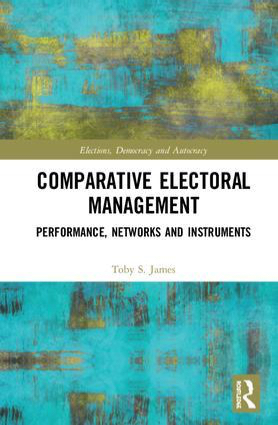NOW PUBLISHED with Routledge as part of the Elections, Democracy and Autocracy Routledge Book Series (edited by Pippa Norris and Carolien van Ham).
Although there are thousands of volumes on elections, few have considered the challenge of organising them. This book presents the first comparative monograph on the management of elections.

The book defines electoral management as a new, inter-disciplinary area and advances a realist sociological approach to study it. A series of new, original frameworks are introduced, including the PROSeS framework which can be used by academics and practitioners around the world to evaluate electoral management quality. A networked governance approach is also introduced to understand the full range of collaborative actors involved in delivering elections, including civil society and the international community. Finally, the book evaluates some of the policy instruments used to improve the integrity of elections, including voter registration reform, training and the funding of elections. Extensive mixed methods are used throughout including thematic analysis of interviews, ethnography, comparative historical analysis; and, cross-national and national surveys of electoral officials.
This text will be of key interest to scholars, students and practitioners interested and involved in electoral integrity and elections, and more broadly to comparative politics, public administration, democratisation, development, international relations and democracy studies.
Reviews
“Toby James demonstrates very convincingly in this major book that electoral management matters a lot for the quality of elections and for how reliable elections results are as a reflection of the electorate’s intentions. Comparative Electoral Management is, therefore, a book that will be of great value for at least three audiences: students of elections, electoral practitioners, and – hopefully – politicians interested in the improvement of the quality of elections and electoral administration in their country.”
Jørgen Elklit, Professor of Political Science, Aarhus University, Denmark
“In Comparative Electoral Management Toby James provides an in-depth comparative analysis of one of the core administrative functions of democracy. Rich in data and innovative conceptualisation, the book draws on insights from a variety of disciplines to address a topic whose urgency is rapidly becoming apparent to citizens the world over. The result is a highly-informed and perceptive analysis of how elections are run and how they might be improved.”
Sarah Birch, Professor of Political Science, Kings College London
“There is no democracy without elections. Elections enable citizens to reflect on, interact with, and directly affect who represents them in state institutions. To ensure this orderly transfer of power electoral management bodies play a crucial role. Their performance makes the difference between contested or non-contested elections, a smooth transfer of power or violence or societal instability. This ground-breaking study is the first to give election management as a practice the scholarly attention they rightly deserve. Toby James’ insights on organizing elections provide invaluable evidence and advice for policy makers and election practitioners alike.”
Therese Pearce Laanela, Head of Electoral Processes, International IDEA
Contents page
Part I: Foundations
1. Why Electoral Management Matters (open access – download free)
2. A Realist Sociological Approach
Part II: Performance
3. Existing Concepts and Evidence
4. The PROSeS Framework (open access – download free)
Part III: Networks
5. Electoral Management Governance Networks
6. UK Electoral Management Governance Networks
7. Comparative Electoral Management Governance Networks
8. International Electoral Management Governance Networks
Part IV: Instruments
9. Voter Registration Reform
10. Centralisation
11. Human Resource Practices
12. Resources and Austerity (download author’s accepted version)
Part V: Looking Forward
13. Conclusions
